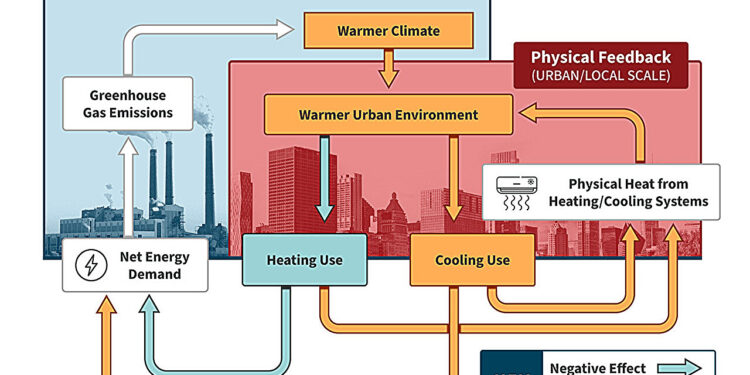This graph shows the physical and chemical effects of global warming on energy consumption for urban heating and cooling. Credit: Michael Vincent and Lei Zhao
Current global energy projections underestimate the impact of climate change on district heating and cooling systems by about 50% by 2099 if greenhouse gas emissions remain high, researchers report. This mismatch could have profound implications for critical sustainable energy planning for the future.
Existing studies focus primarily on chemical feedback loops, which are large-scale processes involving complex interactions between energy use, greenhouse gas emissions, and the atmosphere. However, a research group led by the University of Illinois at Urbana-Champaign is focusing on the often-overlooked physical interactions between urban infrastructure and the atmosphere, which can contribute to local microclimates and, ultimately, global climate.
A new study led by Lei Zhao, professor of civil and environmental engineering, highlights that small-scale heat losses in cities from the heating and cooling efforts of residential and commercial properties can have significant impacts on local climate and energy consumption. The study results are published in the journal Nature Climate change.
“The heat generated by heating and cooling systems accounts for a significant portion of the total heat generated in urban areas,” Zhao said. “These systems generate a lot of heat that is released into the atmosphere of cities, making them warmer and further increasing the demand for indoor air conditioning systems, which feeds even more heat into local climates.”
This process is part of what the researchers call a positive physical feedback loop between the use of building cooling systems and the warming of local urban environments. The authors also note that rising temperatures linked to climate change could potentially reduce energy demand during colder months, a negative feedback loop that should be factored into any projection of temperature and energy demand.
A new study by engineers at the University of Illinois has found that district heating and cooling will play a significant role in future energy demand under climate change. Credit: Tinou Bao
According to the study, reduced use of heating would lead to reduced heat release into the urban environment, thereby leading to less urban warming than in the current climate.
“This process creates a negative physical feedback loop that could slow the decline in heating demand,” Zhao said. “But it does not negate the positive feedback loop effect. On the contrary, our model suggests that it could polarize seasonal electricity demand, which poses its own set of problems that require careful planning.”
To include these neglected physical contributions in the broader global picture of climate change, the team used a hybrid modeling framework that combines dynamic Earth system modeling and machine learning to examine global district heating and cooling energy demand in the context of the variability and uncertainties of urban climate change, including the spatial and temporal challenges posed by the fact that cities vary in income, infrastructure, population density, technology, and temperature tolerance.
“I think the take-home message from this study is that energy projections that incorporate the effects of both positive and negative physical feedback loops are needed and will lay the foundation for more comprehensive climate impact assessment, science-based policymaking, and coordination on climate-sensitive energy planning.”
Zhao’s team is already exploring how variables and uncertainties such as humidity, building materials and future climate change mitigation efforts will be further factored into their models to improve energy demand projections.
More information:
Xinchang ‘Cathy’ Li et al., Increased urban energy risks due to climate-induced biophysical feedbacks, Nature Climate change (2024). DOI: 10.1038/s41558-024-02108-w. www.nature.com/articles/s41558-024-02108-w
Provided by the University of Illinois at Urbana-Champaign
Quote:District heating and cooling will play an important role in future energy demand in the context of climate change (2024, September 13) retrieved September 13, 2024 from
This document is subject to copyright. Apart from any fair dealing for the purpose of private study or research, no part may be reproduced without written permission. The content is provided for informational purposes only.



